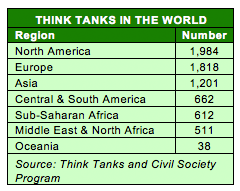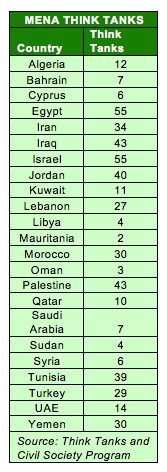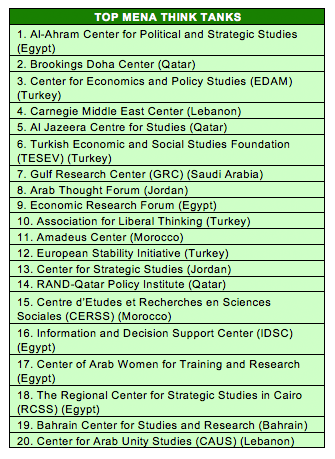The Middle East and North Africa has the fewest number of think tanks in the world, highlighting the lack of research and cross-pollination of ideas that would help fuel innovation in the region.
Think tanks are research and advocacy institutions that examine theories, ideas and policies and offer ideas and advice on political, social and economic issues.
The MENA region has 511 think tanks, compared to 612 in Sub-Saharan Africa, and 1,201 in Asia.
The report, produced by The Think Tanks and Civil Society Program (TTCSP), compiled a list of 6,826 global think tanks -- with North America (1,984) and Europe (1,818) leading the way.
"In the world filled with tweets and sound bites that are often superficial and politically charged, it is critical to know where to turn for sound policy proposals that address the complex policy issues that policymakers and the public face," said James McGann, PhD, director of the University of Pennsylvania's Think Tanks and Civil Societies Program.
"This index is designed to help identify and recognize the leading centers of excellence in public policy research around the world."

EGYPT AS THINK TANK HUB
Egypt, traditionally considered a thought center in the Middle East, had the largest number of think tanks in the region, with 55 institutions - and was ranked 19th globally among countries with the largest number of think tanks.
Excluding Israel, Iraq and Palestine shared top second spot in the region with 43 think tanks each.
Non-oil economies in the region appear to be more driven to examine new ideas and that is evident with Jordan (40), Tunisia (39) and Morocco (30) being home to more than a few dozen think tanks.
Gulf countries may top GDP per capita lists, but they fare poorly in the development of independent thought and analysis. Combined, the six Gulf states have 52 think tanks - fewer than Egypt, Kenya or Romania.
The importance of think tanks cannot be underestimated especially at a time when much of the Middle East remains in turmoil. Countries are pursuing structural changes in their constitutions, experimenting with new templates to manage the restive population and finding new ways to engage and construct dialogue with opposing parties, and Arab intellectuals, social scientists and economists need to be at the forefront of this debate.
"Ideas tend to filter through a hierarchy," say the US National Centre for Policy Analysis. "They start in the realm of intellectuals. Through conferences, speeches, briefings and reports written for lay readers, the audience expands. The ideas begin to appear in newspaper editorials. Special interests may find an idea to their liking and help it along. Gradually, more and more people become aware of it. Politicians are often the last to climb on board. Still, it's a process that has been repeated again and again."
While the Middle East is fond of hosting conferences and events -- indeed it has a burgeoning meetings, incentives, conferences and exhibitions (MICE) industry -- there is an underdeveloped focus on new ideas and theories that can be floated on these platforms.
TOP INSTITUTIONS
Al-Ahram Center for Political and Strategic Studies in Egypt, emerged as the Middle East North Africa's top research institution, followed by Brookings Doha Center in Qatar, the Center for Economics and Policy Studies (EDAM) in Turkey, and the Carnegie Middle East Center in Lebanon.
Middle East institutes did not feature prominently among the top sector-specific think tanks, even in areas of energy, environment or development.
Still, The Regional Center for Strategic Studies in Cairo and Al-Ahram Center for Strategic and Political Studies were among the top think tanks "in defense and national security" arena.
The Egyptian Center for Economic Studies was among the top domestic economic policy institute. Other Egypt institutes such as the Arab Reform Alternatives (13th best in advocacy campaign) and Tahrir Data Project (best use of the Internet) also got honorable mentions in the report.
The Regional Centre for Strategies Studies in Cairo was listed among "the best new think tanks" in the world.
SUB-SAHARAN AFRICA
Far more think tanks have mushroomed in Sub-Saharan Africa compared to Middle East North Africa, partly because of the less regimented, at times even chaotic, economies.
South Africa has been a traditional leader in all socio-economic aspects in the continent, and that is evident with close to 88 research institutes that thrive in the G20 country.
There is a sense that the more progressive economies tend to have more think tanks. Kenya (57 think tanks), Nigeria (51), Ghana (38), Ethiopia (25) and Uganda (29) are often viewed as the new economic stars of Africa, and there may be a relationship between flourishing economies and a greater interest in sharing ideas and analysis by research institutes.
Of course, it is no surprise that some of the most dynamic economies in the world - the United States, China, United Kingdom, India and Germany -- also have the highest number of think tanks in the world.
The feature was produced by alifarabia.com exclusively for zawya.com.
© Zawya 2014




















